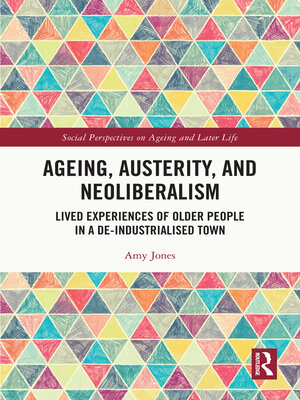Ageing, Austerity, and Neoliberalism
ebook ∣ Lived Experiences of Older People in a De-Industrialised Town · Social Perspectives on Ageing and Later Life
By Amy Jones

Sign up to save your library
With an OverDrive account, you can save your favorite libraries for at-a-glance information about availability. Find out more about OverDrive accounts.
Find this title in Libby, the library reading app by OverDrive.



Search for a digital library with this title
Title found at these libraries:
| Library Name | Distance |
|---|---|
| Loading... |
This book explores how neoliberalism and austerity have affected older people living within a deindustrialised town, utilising a Foucauldian approach and an ethnographic methodology.
It seeks to bridge the gap between high sociological theory and a research focus upon older people. The link between the micro (real people, within a real place) and macro (abstract processes) is examined, and a mid-range theory of change is innovatively developed to highlight how older people are having to negotiate national transformations at the everyday level. Key themes within this book include the recreation of human subjectivity, antiwelfarism, the stigmatisation and exclusion of the poor, the fragmentation of the working class, and nostalgia. Innovative terms such as 'stigma-adaptation' and 'abnormal abnormality' are included to help deepen our knowledge and understanding of the social sciences, to highlight the injustices caused by current global processes, and to ultimately inform change.
This book will be of interest to scholars and students across the social sciences, particularly those studying inequalities in the modern world, neoliberalism and the economy, social theory, ageing and older people and community studies, and postgraduates who are seeking to undertake applied research. It would also be valuable for policymakers and service providers.







